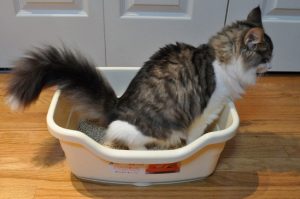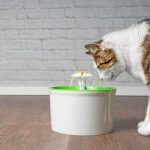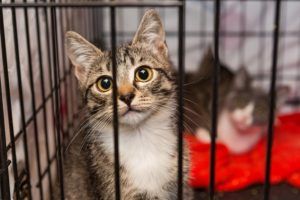What you need to know about caring for a cat with Feline Idiopathic Cystitis.
Change can be hard for everyone – and cats are no exception. Their stoic nature may hide stress that manifests in a number of physical symptoms collectively known as Feline Idiopathic Cystitis, or FIC.
OHS veterinarian Dr. Victry Fredley explains this mysterious condition and how to keep a cat with FIC healthy and happy.
What is Feline Idiopathic Cystitis?
 Feline Idiopathic Cystitis (FIC) is an umbrella term for a collection of clinical signs that your cat may exhibit such as straining to urinate, blood in urine, urinating in inappropriate places such as on your bed or on carpet, licking at the urinary opening, and in severe cases, signs of urethral blockage.
Feline Idiopathic Cystitis (FIC) is an umbrella term for a collection of clinical signs that your cat may exhibit such as straining to urinate, blood in urine, urinating in inappropriate places such as on your bed or on carpet, licking at the urinary opening, and in severe cases, signs of urethral blockage.
The underlying problem that leads to these clinical signs is stress. Your cat can be stressed for a number of reasons, including changes in his or her environment (cat’s don’t like change!) such as moving furniture, construction happening in the neighborhood or at home, a change in household dynamics such as a person moving in or leaving, or a new pet in the household, a change in schedules (all of a sudden my dad is home all the time??) or even a change in diet.
This stress leads to changes in the brain and the bladder that causes the bladder to be painful and become inflamed. Think of it like how humans get headaches when they are stressed; instead of getting headaches, cats get bladder-aches. This causes them to feel pain when they urinate which causes them to urinate in inappropriate places and they will even urinate blood because of the inflammation in the bladder wall.

My own rescue cat has showed signs of FIC and this happened after we had moved to a new house, changed the furniture, and then to top it off, I accidently scared my adorable cat Fizzgig with the vacuum cleaner! The next day, he was showing signs that he couldn’t pee at all! This was a medical emergency!
What is urethral obstruction and how is it different from FIC?
Urethral obstruction is the most severe form of FIC, and it constitutes a medical emergency. Urethral obstruction is seen in male cats (and very rarely in female cats), when they become so stressed that their bladder and urethra become so inflamed, that they can’t urinate at all. This is an emergency because when a cat can’t urinate, his bladder quickly becomes too full of urine and this can cause kidney damage and electrolyte abnormalities that could lead to death. This is why if you suspect that your cat can’t urinate at all, bring him to a vet immediately because cats can die from urethral obstruction.
When my cat blocked, I noticed he wasn’t urinating in the litterbox at all, and would just sit there straining and straining. I knew it had become an emergency when he could not produce any urine at all, and he didn’t eat his morning breakfast, which he is usually very excited about! As a veterinarian, I also was able to palpate his bladder, and I could feel that it was very hard, like a huge rock in his abdomen. I took him to the veterinary ER, where they sedated him and unblocked him by passing a urinary catheter up his urethra to relieve the obstruction.
Not all cats that show signs of FIC, however, will show signs of urethral obstruction. With good management of stress, along with changes in diet, water intake and weight management, your kitty can live a normal happy life without ever becoming blocked.
How to manage FIC
Since FIC is caused by your kitty being stressed, it is important to lessen his or her stress levels. Cats don’t like change, such as moving furniture, moving houses or loud noises, so try to keep these things to a minimum. Make sure that your kitty has many places to hide, in case he or she wants to get away from other pets or humans in the household.
Litterboxes
 Each cat should have multiple litterboxes available to them, and the litterboxes should be placed in low-traffic areas (i.e. not in the living-room where all the kids are playing!) such as in a corner of a quiet bedroom. For residences with multiple stories, each floor should have its own litterbox so that your kitty doesn’t have to go up or down stairs to get to a litterbox. Some kitties prefer different types of litter, and if your kitty doesn’t like the type of litter you have bought (maybe it smells funny to them, or they don’t like the feel of it under their paws), this could cause them stress and anxiety and lead them to show signs of FIC. Because of this, it is prudent to figure out what kind of litter your kitty likes the best, and use that litter for litterboxes.
Each cat should have multiple litterboxes available to them, and the litterboxes should be placed in low-traffic areas (i.e. not in the living-room where all the kids are playing!) such as in a corner of a quiet bedroom. For residences with multiple stories, each floor should have its own litterbox so that your kitty doesn’t have to go up or down stairs to get to a litterbox. Some kitties prefer different types of litter, and if your kitty doesn’t like the type of litter you have bought (maybe it smells funny to them, or they don’t like the feel of it under their paws), this could cause them stress and anxiety and lead them to show signs of FIC. Because of this, it is prudent to figure out what kind of litter your kitty likes the best, and use that litter for litterboxes.
Pheromones
Since FIC is primarily caused by stress, stress reduction in the form of pheromones can also help. There are products on the market like Feliway, which is a synthetic analogue of a feline facial pheromone. Cats exposed to this pheromone show increased grooming, interest in food, and overall signs of decreased stress. Feliway comes as a diffuser and can be plugged into a wall, or it also comes as a spray that can be sprayed on a towel or collar to help calm your kitty friend.
Water consumption
 Also, make sure your kitty has ample access to fresh clean water. By encouraging your kitty to drink water, this will help keep your kitty hydrated and dilute the urine which helps flush out any urinary crystals or blood. Adding a water fountain to your home is a great idea, as many cats like drinking from a running water source. Make sure there are multiple bowls of water or fountains throughout your house, so that your kitty can get a drink wherever he or she is. Feeding wet food instead of dry food may also be beneficial in increasing water consumption.
Also, make sure your kitty has ample access to fresh clean water. By encouraging your kitty to drink water, this will help keep your kitty hydrated and dilute the urine which helps flush out any urinary crystals or blood. Adding a water fountain to your home is a great idea, as many cats like drinking from a running water source. Make sure there are multiple bowls of water or fountains throughout your house, so that your kitty can get a drink wherever he or she is. Feeding wet food instead of dry food may also be beneficial in increasing water consumption.
Diet and weight
Your veterinarian may also recommend a special diet for your FIC kitty. Special diets include ingredients that change the urine pH to dissolve any urinary crystals that might be present in the urine, as well as ingredients such as antioxidants and omega 3 fatty acids that may also help with FIC. It is also important to make sure your kitty does not become overweight, as overweight cats are more predisposed to showing signs of FIC and urethral obstruction. Although the reason for this is unknown, it may be due to a cat’s sedentary lifestyle.
Mental stimulation
Cats are born to be hunters, and if they aren’t getting mental and physical stimulation from their environment then they can become stressed. Allowing your cat supervised or leashed outdoor time or building a catio may help your kitty fulfill his or her natural instincts to be a hunter. Adding perches, toy, cat trees and scratching posts to your house will also give your kitty some mental stimulation as well.
Multi-cat household
Some cats show signs of FIC when they are in a multi-cat household where they do not get along with the other cats. Not all cats that live with other cats will show signs of FIC, as many cats get along with other cats quite well. But if your kitty doesn’t get along with other cats or doesn’t get along with another specific cat in the household, this could case your kitty to show signs of stress and FIC. So be aware that if you are adopting a kitty with FIC, he or she may like to be the only cat.
Medical management
Medical management of FIC with your veterinarian includes pain management in the form of analgesics such as buprenorphine, anti-inflammatory meds, and drugs that decrease urethral spasm and contracture. If your cat is experiencing an episode of FIC, your veterinarian will talk with you about the best types of medications for your kitty. They may even discuss putting your kitty on an anti-depressant medication as this can also alleviate your kitty’s stress.
Can female cats get FIC?
Yes! Female cats can get FIC! Because the urethral tract is shorter in female cats than male cats, they are much less likely to have a urethral obstruction, but this does not mean that they don’t still get FIC! They can become stressed just like male cats, and their bladders can become painful and inflamed as well.
FIC in a shelter environment
 Because FIC is caused by stress, there are many cats that come into the shelter that show signs of FIC. We may get cats that are surrendered because they show signs of FIC, and previous owners did not like having their cat urinating outside of the litterbox. Other cats do not show signs of FIC when they are first surrendered to the shelter, but then start showing signs because they are in a new stressful environment that they are not used to. Finally, OHS also takes some cats that have urethral obstructions and we hospitalized and manage their urethral obstructions so that they can get better and be put up for adoption. We will treat all of these cats by attempting to decrease their stress levels in the shelter environment by giving them enrichment, using pheromones, ample access to water and different types of litter, as well as medically managing them with analgesic and behavioral medications if needed.
Because FIC is caused by stress, there are many cats that come into the shelter that show signs of FIC. We may get cats that are surrendered because they show signs of FIC, and previous owners did not like having their cat urinating outside of the litterbox. Other cats do not show signs of FIC when they are first surrendered to the shelter, but then start showing signs because they are in a new stressful environment that they are not used to. Finally, OHS also takes some cats that have urethral obstructions and we hospitalized and manage their urethral obstructions so that they can get better and be put up for adoption. We will treat all of these cats by attempting to decrease their stress levels in the shelter environment by giving them enrichment, using pheromones, ample access to water and different types of litter, as well as medically managing them with analgesic and behavioral medications if needed.






